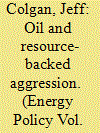| Srl | Item |
| 1 |
ID:
153811


|
|
|
|
|
| Summary/Abstract |
Gender diversity is good for the study of international relations (IR) and political science. Graduate training is an opportunity for scholars to affect the demographics of their field and the gendered practices within it. This article presents a first-cut investigation of the degree to which gender bias exists in graduate IR syllabi. The author found that the gender of the instructor for graduate courses matters significantly for what type of research is taught, in two ways. First, on average, female instructors assign significantly more research by female authors than male instructors. Second, women appear to be considerably more reluctant than men about assigning their own research as required readings. Some but not all of the difference between male- and female-taught courses might be explained by differences in course composition.
|
|
|
|
|
|
|
|
|
|
|
|
|
|
|
|
| 2 |
ID:
103467


|
|
|
|
|
| Publication |
2011.
|
| Summary/Abstract |
A common misperception about oil politics is that it has a uniform, monolithic effect on policy development. This paper argues that in fact the net political effect of oil varies dramatically depending on the nature of the petrostate. It shows that oil income, when combined with revolutionary governments in petrostates, generates strong incentives for foreign policy aggression and international conflict. The aggressiveness of petro-revolutionary states is shown to have consequences in both military and economic spheres of international relations. Militarily, the aggressiveness of this type of state leads to a high rate of armed conflicts. Economically, the aggressiveness of petro-revolutionary states shapes global oil markets and international economic relations. The argument is tested using statistical analysis of international conflicts and economic sanctions. The policy implications are then considered, focusing on the negative global impacts of dependence on oil consumption.
|
|
|
|
|
|
|
|
|
|
|
|
|
|
|
|
| 3 |
ID:
109918


|
|
|
|
|
| Publication |
2011.
|
| Summary/Abstract |
The Stockholm International Peace Research Institute (SIPRI) and the International Institute of Strategic Studies (IISS) both publish datasets on military expenditure that are widely used by scholars and military analysts. This article illustrates the limitations in the reliability and validity of these data, using a case study of contemporary Venezuela to highlight the issues. There is a debate over recent Venezuelan military expenditure under President Chávez: some argue that the expenditure has increased dramatically; others argue that it has not. The SIPRI and IISS datasets ought to be tailor-made for resolving this debate, but the estimates they provide are significantly flawed: military spending is reported to be quite low and to have declined as a percentage of GDP. New evidence presented in this article suggests that Venezuela's recent military expenditures were typically at least 20% to 70% higher than the estimates provided by SIPRI and IISS. Moreover, the military expenditures have at least kept pace with GDP growth as oil revenues increased over the period 2002-08. A key source of the discrepancy in the estimates is the way in which extra-budgetary purchases, especially of foreign arms and supplies, are treated. In some states, such as Venezuela in recent years, extra-budgetary purchases are responsible for a large portion of the expenditure, but these purchases are frequently not captured by standard data sources.
|
|
|
|
|
|
|
|
|
|
|
|
|
|
|
|